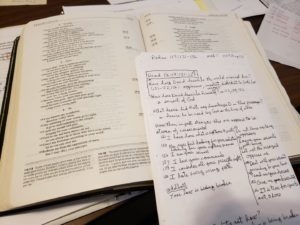
I had planned for my blog post today to again be about Documenting America: Making The Constitution Edition. Today I made a few last edits to Chapter 5, based on comment last week by my critique group. This morning I did a run-through for typos, commas, formatting of references, etc. That done, I hereby declare the text finished. I’m now ready to begin the publishing process.
But I’m delaying that post. Yesterday in our adult Life Group at church we had an interesting discussion that I feel deserves a post. We are going through a video-based Bible study on Psalm 119. The video series is an original production of RightNow Media, to which our church has a subscription service. The presenter in this series is Matt Chandler, a pastor in the Dallas Texas area.
Yesterday we were on the 7th of 10 videos in the series, this one covering Psalm 119:121-136. In preparation for the class, I focused on vs. 121-128. I divided the statements in these verses into two categories: statement of existing conditions; and prayer to God. All verses fit well into those categories but one. Here are the statements of condition.
- vs 121 I have done what is righteous and just.
- vs 123 My eyes fail looking for your salvation, looking for your righteous promise.
- vs 125 I am your servant.
- vs 126 Your law is being broken.
- vs 127 I love your commands more that gold, more than pure gold.
- vs 128 I consider all your precepts right.
- vs 128 I hate every wrong path.
And here are the prayers.
- vs 121 Do not leave me to my oppressors.
- vs 122 Ensure your servant’s well-being.
- vs 122 Let not the arrogant oppress me.
- vs 124 Deal with your servant according to your love.
- vs 124 Teach me your decrees.
- vs 125 Give me your discernment that I may understand your statutes.
And, that one verse that doesn’t fit in? It’s vs 126a:
Vs 126a: It is time for you to act, O Lord.
This is the verse I decided to spend more time on than the others. It’s sort of a prayer, but not exactly. It’s more of a command. A command the pray-er is making to God. The entire verse 126 is:
Vs 126: It is time for you to act, O Lord; your law is being broken.
As if God needed the pray-er to tell Him His law was being broken. As if God needed to be commanded. What audacity in David to make such a statement!
In class, we focused on what to do if we ever found ourselves making such a statement, telling God He needed to act. One class member said instead we ought to be asking God how we can join in what He is doing. “It is time for you to act, O Lord. How can I help You?” Or even, “It is time for you to act, O Lord; your law is being broken. What can I do about it?”
Now that’s a way to address God. You aren’t then telling him what’s wrong and demanding He do something. You’re acknowledging to God that you recognize the present condition in your part of the world, that the condition is because of people disobeying God, and asking how I can effectively take part in correcting the problem. I like that.
It turned out to be a good class. Lots of interaction, people focused on the scripture, many positive statements. Everyone who spoke embraced the concept of asking God how we can participate in the places we believe He needs to act. We left the class energized and, I think, excited about serving him this week.
Could the verse be an observation rather than a command? Or perhaps a plea coming out of the discernment requested in the previous verse?
OTOH, C.S. Lewis notes in his personal impressions about the psalms that they do not always conform to modern thinking. It was a different time, place, and culture.
Yes, I think David’s statement could be considered an observation rather than a command. I’d feel more comfortable with that interpretation if it had been worded, “It’s time for the Lord to act.”
I’m reading a book about the Inklings right now. Hope to get back to Lewis’ essays soon.